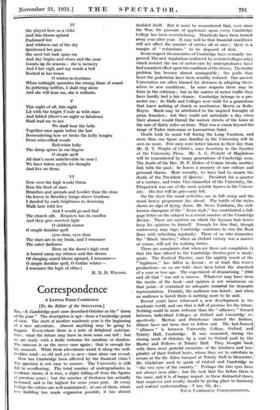Correspondence
A LETTER FROM CAMBRIDGE
[To the Editor of the SPECTATOR.]
Sin,—A Cambridge poet once described October as the " dawn of the year." The description is apt—from a Cambridge point of view. The start of another academic year is the beginning of a new adventure. Almost anything may be going to happen. Everywhere there is a note of delighted anticipa- tion ; what the future may have in store none can. tell : but we are ready with a frolic welcome for sunshine or shadow. The caravan is on the move once again ; that is enough for the moment. What fresh adventures await it along the well- trodden road—so old and yet so new—time alone can reveal.
How has Cambridge been affected by the financial crisis The question is not easy to answer. The University is still full to overflowing. The total number of undergraduates in residence shows, it is true, a slight falling-off from the figures of previous years ; but the number of freshmen has actually increased, and is the highest for some years past. At every College the entries are well maintained ; at one of them, where new • building has made expansion possible, it has almost
doubled itself. But it must be remembered that, ever since the War, the pressure of applicants upon every Cambridge College has been overwhelming. Hundreds have been turned away year after year. It may well be that financial conditions will not affect the number of entries all at once ; there is a, margin of " redundants " to be disposed of first.
In one respect the amenities of Cambridge have certainly im- proved. The new regulations (enforced by certain Colleges only) which restrict the use of motor-cars by undergraduates have had a marked effect upon the condition of the streets. The traffic
problem has become almost manageable ; the perils that beset the pedestrian have been sensibly reduced. Our ancient Universities are often blamed for slowness in adapting them- selves to new conditions. In some respects there may be force in the criticism ; but in the matter of motor traffic they have hardly had a fair chance. Cambridge belongs to a pre- motor era ; its Halls and Colleges were built for a generation that knew nothing of clutch or accelerator, Morris or Rolls- Royce. Much may be attributed to the inspired foresight of pious founders ; but they could not anticipate a day when their alumni would thread the narrow streets of the town at the rate of thirty miles an hour. That was a vision beyond the range of Tudor statesman or Lancastrian Saint.
Death took its usual toll during the Long Vacation, and more than one figure once familiar in the University will be seen no more. Few men were better known in their day than Mr. R. T. Wright of Christ's, once Secretary to the Syndics of the University Press. Mr. A. G. Peskett of Magdalene will be remembered by many generations of Cambridge men, The death of the Rev. H. P. Stokes of Corpus breaks another link with the past ; he leaves a memory of rare culture and personal charm. More recently, we have had to mourn the death of the President of Queens'. President for a quarter of a century, and twice Vice-chancellor of the University, Dr. Fitzpatrick was one of the most notable figures in the Univer- sity. His loss will be grievously felt.
On the river the usual activities are in full swing and the
usual heavy programme lies ahead. The battle of the styles shows no sign of dying down. Mr. Steve Fairbairn, the well- known champion of the " Jesus style," has contributed a full- page letter on the subject to a recent number of the Cambridge Review. These are matters on which the layman had better keep his opinions to himself. Enough for him that, though controversy may rage, Cambridge continues to win the Boat Race with refreshing regularity. Those of us who remember the "Black 'nineties," when an Oxford victory was a matter of course, will ask for nothing better.
There are complaints (but when are there not complaints ?) that the fare offered to the Cambridge theatre-goer is inade- quate. The Festival Theatre, once the nightly resort of the highbrow," has fallen in favour ; or at least this term's productions—so we are told—have been below the standard of a year or two ago. The experiment of dramatizing " 1000 and all that " was not a success. Whatever may have been the merits of the book—and opinion is not unanimous on that point—it contained no adequate material for dramatic representation. Frankly, the audience was bored ; and when, an audience is bored there is nothing more to be said.
Recent years have witnessed a new development in the academic world, and one that is full of promise for the future. Nothing could be more welcome than the " alliances " formed between individual Colleges at Oxford and Cambridge re- spectively. Merton and Peterhouse started the fashion..
Others have not been slow to follow suit. The last-formed "alliance " is between University College, Oxford, and Trinity Hall, Cambridge. It was cemented, during the closing week of October, by a visit to Oxford paid by the Master and Fellows of Trinity Hall. They brought back with them most grateful memories of the kindness and hos-1 pitality of their Oxford hosts, whom they are to entertain in return at the Dr. Eden banquet at Trinity Hall in December.1 Mr. Gladstone used to speak of Oxford and Cambridge as " the two eyes of the country." Perhaps the two eyes have not always seen alike ; but the task that lies before them is the same, and it is of happy import, in these distracted times, that suspicion and rivalry should be giving place to harmony and matual understanding.—I am, Sir, &c.,
YOUR CAMBRIDGE CORRESPONDENT.
































































 Previous page
Previous page